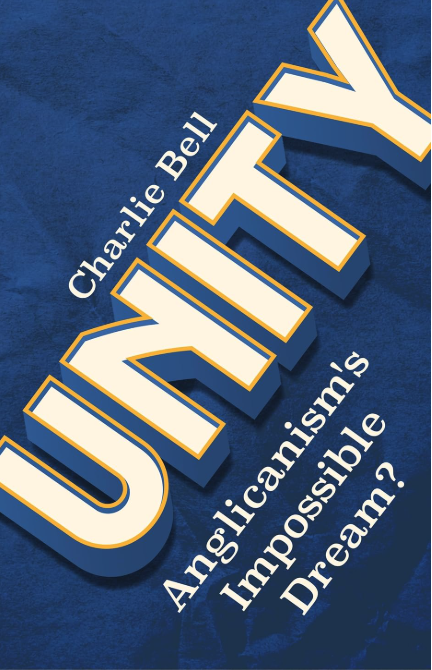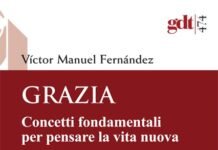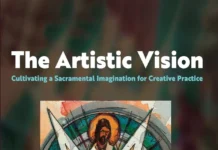Charlie Bell’s book Unity – Anglicanism’s Impossible Dream [1] is a book that it is difficult to review because it is a book that does not contain a single unified argument. Instead, the three parts of the book, ‘Where we find ourselves,’ ‘Reflections on unity’ and ‘The search for Anglican unity.’ consist of a series of disparate reflections on the Bible, the Patristic era, the Church of England, the Anglican Communion and the nature of ecumenism.
Responding to the various separate points that Bell makes on these topics would be impossible within the scope of a reasonable length review, so this is not something which I shall attempt to do. What I shall do instead is respond to five key passages in Bell’s final chapter ‘Walking together and walking apart: Anglican unity in a time of crisis’ in which, it seems to me, he sets out the main points that he wants to get across in his book as a whole.
The first passage considers the issue of whether Christians can be ‘out of communion’ with one another. On this issue Bell writes as follows:
‘There is however something interesting and inconsistent about the suggestion that any church can be ‘out of communion’ with another. While this may indeed by true in visible form it is not at all clear that it is within the gift of humankind to determine whether or not one is in communion with one another, whether or not one believes them to have the right doctrine, or even to be a Christian. If we see koinonia as a ‘gift to be received, not only personally but as one within the Body, a fellowship in Christ across time in the communion of Saints,’ then our perspective must surely switch from being those who decide who else is welcome at God’s table to being those who are invited to eat at the table alongside whoever else God has chosen to invite. Such koinonia is revealed in mutual sharing, mutual recognition, mutual respect, and mutual belonging, a relational way of being together in Christ, which seems to be a good way of describing the ultimate aim and purpose of the Anglican Communion.
Thus, while we may furiously disagree with one another over matters of doctrine, there does appear to be a gospel imperative to break bread together, and to come to a table that belongs to neither conservative nor liberal. Indeed, in Anglicanism congregations and clergy approach the same table with varying beliefs about what the sacrament itself entails or means, yet they still approach. While Paul’s command, ‘Do not eat with such a one’ (1 Corinthians 5:9-13), may provide justification for a refusal to approach the table with those we might consider to be ‘sexually immoral,’ it appears that the imperative to come to the table that is Christ’s, to which he is always inviting his friends to share his meal with him in joy and love, supersedes this command when it comes to Christ’s meal and not our own. Indeed, given the Eucharist is primarily a metaphysical and ecclesial reality, it appears that even if we wanted to we could not ‘not receive’ alongside others.’ For as often as you eat this bread and drink this cup you proclaim the Lord’s death until he comes,’ says Paul in the same letter, (1 Corinthians 11:26), and in so doing we join all Christians in Christ’s feast that he entrusts to his whole church, whether or not we exclude them or excuse ourselves from a celebration at that particular place and time. God’s primacy is paramount. ‘ (pp.184-5)
As I see it, the problem with what Bell writes in these paragraphs is that he fails to distinguish between the two forms of the Church, the Church invisible and the Church visible. The classic Anglican statement of the distinction between these two forms of the Church is that by Richard Hooker in The Laws of Ecclesiastical Polity. Hooker describes the Church invisible, which he describes as the Church ‘mystical’ in the following terms:
‘That Church of Christ, which we properly term his body mystical can be but one; neither can that one be sensibly discerned by any man, in as much as the parts there of our so in heaven already with Christ, and the rest that are on earth (albeit their natural persons be visible) we do not discern under this property, whereby they are truly and infallibly of that body. Only our minds by intellectual conceit are able to apprehend, that such a real body there is, a body collective, because it containeth a huge multitude; a body mystical, because the mystery of their conjunction is removed altogether from sense. Whatsoever we read in Scripture concerning the endless love and the saving mercy which God sheweth toward his Church, the only proper subject thereof is this Church. Concerning this flock it is that our Lord and Saviour hath promised, ‘I give then eternal life, and they shall never perish, neither shall any pluck them out of my hands’[John 10:28]. They who are of this society have such marks and notes of distinction from all others, as are not object unto our sense; only unto God, who seeth their hearts and understandeth all their secret cogitations, unto him they are clear and manifest. All men knew Nathanael to be an Israelite. But our Saviour piercing deeper giveth further testimony than men could have done with such certainty as he did: ‘Behold indeed an Israelite in whom is no guile’ [John 1:47]. If we profess as Peter did [John 21:15], that we love the Lord, and profess it in the hearing of men, charity is prone to believe all things, and therefore charitable men are likely to think we do so, as long as they see no proof to the contrary. But that our love is sound and sincere, that it cometh from ‘a pure heart and a good conscience and love unfeigned’ [1 Timothy 1:5], who can pronounce, saving only the Searcher of all men’s hearts, who alone intuitively know who in this kind are his?’[2]
Hooker then moves on to describe the visible Church, concerning which he writes:
‘And as those everlasting promises of love, mercy, and blessedness belong to the mystical Church ; even so on the other side when we read of any duty which the Church of God is bound unto, the Church whom this doth concern is a sensibly known company. And this visible Church in like sort is but one, continued from the first beginning of the world to the last end. Which company being divided into two moieties, the one before, the other since the coming of Christ ; that part, which since the coming of Christ partly hath embraced and partly shall hereafter embrace the Christian Religion, we term as by a more proper name the Church of Christ. And therefore the Apostle affirmeth plainly of all men Christian that be they Jews or Gentiles, bond or free, they are all incorporated into one company, they all make but one body [Ephesians 2:16, 3:6]. The unity of which visible body and Church of Christ consisteth in that uniformity which all several persons thereunto belonging have, by reason of that one Lord whose servants they all profess themselves, that one Faith which they all acknowledge, that one Baptism wherewith they are all initiated [Ephesians 4:5].’ [3]
The key point to grasp about this distinction between the two forms of the Church which Hooker describes is that while we can say that someone is a member of the visible Church if they conform to the criteria which Hooker lays down in the second quotation, we cannot know with any certainty who is a member of the Church invisible. That is something that is known with certainty only by God. Only he truly knows who are his.
This is relevant to Bell’s argument, because while it is true that, if we are a member of the mystical body of Christ, we are necessarily in communion with all the other members of the body, we cannot know who these members are. As Bell rightly argues it is not ‘within the gift of humankind to determine whether or not one is in communion with one another.’
However, this in turn means that we cannot follow Bell and say that we must be in a relationship of ecclesial communion, and must therefore share the Eucharist with, all members of the visible Church because we are in communion with them as joint members of the Church invisible, That is something that we simply cannot say.
Our task is instead to determine, in line with the guidance provided by the New Testament, what kind of relationship we should have with the other members of the visible Church and in particular whether it is right to share Holy Communion with them.
The key guidance given by the New Testament is given in the passage in 1 Corinthians 5 to which Bell refers. In this passage Paul writes:
‘’Your boasting is not good. Do you not know that a little leaven leavens the whole lump? Cleanse out the old leaven that you may be a new lump, as you really are unleavened. For Christ, our paschal lamb, has been sacrificed. Let us, therefore, celebrate the festival, not with the old leaven, the leaven of malice and evil, but with the unleavened bread of sincerity and truth.
I wrote to you in my letter not to associate with immoral men; not at all meaning the immoral of this world, or the greedy and robbers, or idolaters, since then you would need to go out of the world. But rather I wroteto you not to associate with any one who bears the name of brother if he is guilty of immorality or greed, or is an idolater, reviler, drunkard, or robber—not even to eat with such a one. For what have I to do with judging outsiders? Is it not those inside the church whom you are to judge? God judges those outside. Drive out the wicked person from among you.’’ (1 Corinthians 5:6-13).
As Tom Wright explains in his commentary on 1 Corinthians, this passage reflects the command given to Israel that they should ‘put away all leaven out of your houses’ (Exodus 12:15) during the feast of the Passover.
In the word of Wright, what Paul is saying is that the whole of the Christian life is to be seen as:
‘… one long Passover celebration! That’s what it’s all about. Every breath a Christian takes is a silent Passover-hymn of gratitude to the God who has acted to save the world through Jesus, the true Passover lamb. Every action a Christian performs as part of the endless ceremonial of the Passover-celebration. And at this Passover there must be no leaven. Paul does not, of course, mean that Christians must not eat leavened bread. It’s picture language. The equivalent of leaven within this new Passover life that Jesus’ people are called to live is the behaviour which goes with the old way of life: ‘the leaven of the old life’ is the kind of behaviour that pagans engage in before conversion, and the ‘leaven of depravity and wickedness’ is the kind of behaviour that Christians can be lured back into if they aren’t careful.
…. All such ‘leaven’ is ruled out for Christians, and Paul makes it clear that that is not to be tolerated in the church. Once more, we realise how far many churches in the modern world have travelled away from their roots. Many today have actually elevated moral indifference -on some issues at least- into part of their foundation charter, so that to suggest introducing discipline over (say) sexual misbehaviour would cause a storm of protest, accusations of legalism, Pharisaism, lack of charity, and a host of other nasty things. But Paul is quite clear.
He had already written to Corinth on this subject in a letter which has not survived. They hadn’t understood. They had thought he was saying they should avoid all contact with immoral people, and wondered how on earth they could continue to live in Corinth at all! Now he explains, he meant simply within the church. Table -fellowship among Christians, he says, should be a sign of fellowship which is given to those who are living as the Messiah’s people should and just as Israel was commanded not to tolerate evil in its midst (Deuteronomy 17:7 which Paul quotes in verse 13), so the church must see wickedness for what it is, a cancer which will spread if it is not cut out at the first sign. God will judge those outside the community in his own time and manner. But the Christian community, as he is going to stress in the next chapter, has the God-given right and duty to discriminate between those who are living in the Messiah’s way and those who are not.’[4]
In 1 Corinthians 5 the leaven which the Corinthians are told to avoid those engaging in immoral conduct, but the New Testament teaches that those propagating false and divisive teaching should also be avoided. This is mentioned at various points in the New Testament. Thus Titus 3: 10 speaks of avoiding foolish controversies and ‘having nothing more to do’ with a person who stirs up division; and Romans 16:17 refers to ‘watching out for those who cause divisions and create obstacles contrary to the doctrine that you have been taught; avoid them’. 1 Timothy 6: 11 uses the language of ‘fleeing’ from those who follow a ‘different’ doctrine (vv. 3 and 11). Elsewhere the New Testament refers to not ‘partnering’ with those spreading dangerous teaching (Ephesians 5: 6-7 and 2 John 10-11) and not tolerating those who teach or practice sexual immorality (Revelation 2: 20).
Building on the New Testament teaching that we have just looked at, the tradition of the Christian Church down the centuries, including the churches of the Anglican tradition, has been to impose the discipline of excommunication, at the heart of which is exclusion from Holy Communion, in the case of those who engage in seriously immoral behaviour and those who propagate heresy. As Dietrich Bonhoeffer writes, the aim of this exercise of discipline, what has traditionally been called ‘the power of the keys’ in line with Matthew 16:19, is not :
‘…. to establish a community of the perfect, but a community of men who really live under the forgiving mercy of God. Discipline in a congregation is a servant of the precious grace of God. If member of the church falls into sin, he must be admonished and punished, lest he fall forfeit his own salvation and the Gospel be discredited.’ [5]
Such discipline is not primarily a punishment of the immoral and the heretical. It is rather a a way of warning others not to follow their example and a call to them to repent of their behaviour and their errors while there is still time for them to do so.
Furthermore, contrary to Bell’s argument, the view that has historically been taken is that the same Christ who invites all human beings to feast his table has given those with pastoral authority in the Church the duty to exclude people from Holy Communion as an outward and visible sign of the impairment of communion between them, God, and God’s people that their behaviour has caused.
In the second passage from Bell’s final chapter, he goes on to say that the view of unrestricted communion he outlined in the first passage:
‘… also plays out when considering ‘structural’ provisions suggested for those seeking separation yet continued membership of the Church of England. It is not at all clear how we might claim to remain members of the same church if we cannot receive communion alongside one another, which is surely one of the clear markers not only visible unity but of ecclesial cohesion. Indeed, for those who claim that approaches to same-sex relationships are a first -order salvation issue, it is entirely incoherent to wish to remain part of a church with those who – in this conception – are denying others their salvation and ultimately closing the doors to eternal life. Once again, it is theoretically more consistent for churches to walk away from ‘communion with Canterbury’ if they believe this to be the case, and it does appear to be an extremely confused ecclesiology to wish to remain in the same church (in the case of the Church of England) but with separate structures, such as a diocese or province.‘ (p.185)
There are two points to be made in response to Bell’s argument in this passage.
The first is that it makes perfectly good sense to claim that one is in the same church with someone yet unable to receive communion alongside them. As noted by Hooker, if someone is baptised and professes the Christian faith then we have to acknowledge them to be a fellow member of the visible Church. However, it might still make sense to be unwilling to receive Holy Communion alongside them for the reasons previously given.
The second is that it also makes perfectly good sense to feel an obligation to remain in some form of differentiated fellowship with a church even if it has fallen into very serious error. The reason for this is helpfully explained by the seventeenth century Puritan theologian David Dickson in his book Truth’s Victory over Error.
In this book he addresses the question of whether Christians are obliged ‘to maintain an holy fellowship’ with other Christians who have become corrupt in their theology and/or manner of life. His response is that the example of Christ and the teaching of the apostles Paul and John show that there are a number of reasons why they are obliged to do so:
Read it all in Reflections of an Anglican Theologian



